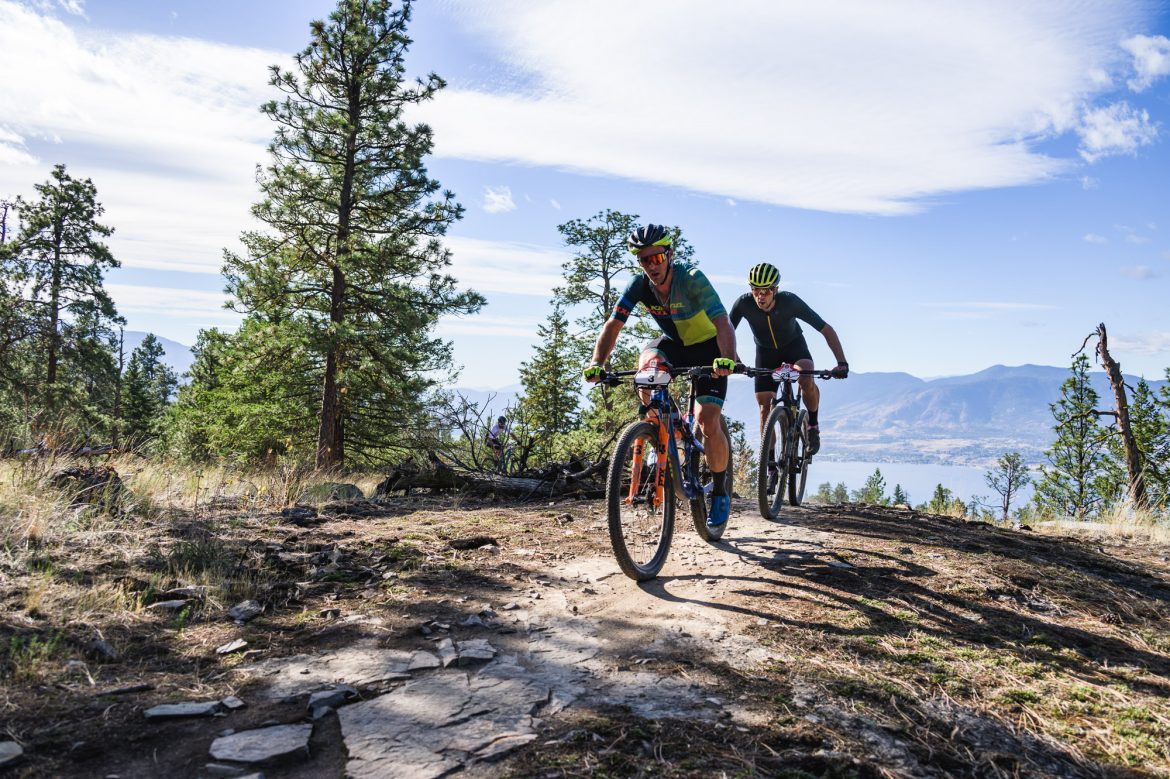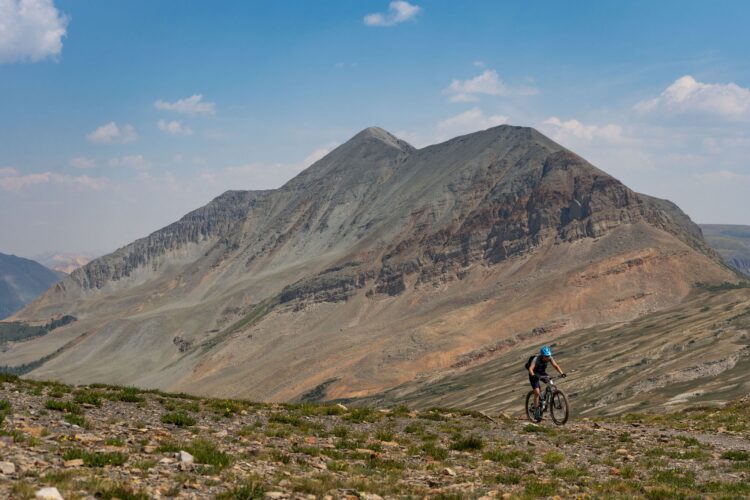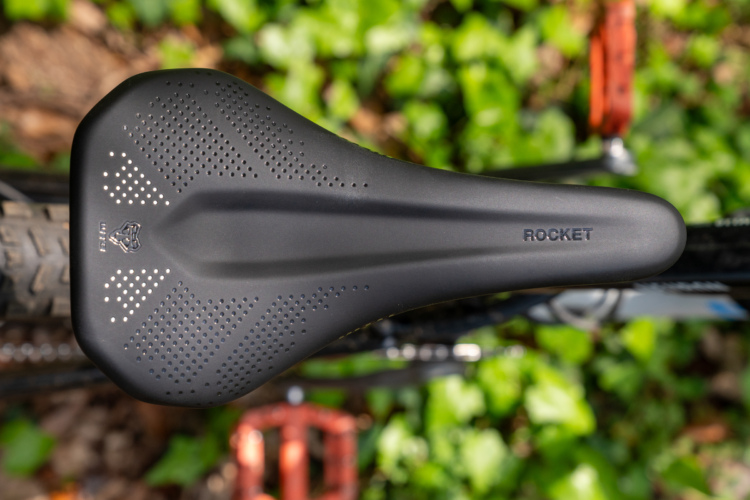
Canada’s border opened to visitors in the nick of time for the BC Bike Race, two weeks before the race was due to kick off. BCBR, usually held in July every year, had been canceled in 2020 and postponed for 2021. They had changed their dates four times and location three times. For a staffed organization that doesn’t make money unless it can hold events, the news that the race would take place couldn’t have come soon enough.
“It was getting really frustrating right down to the wire,” Dre Hestler, BCBR’s marketing director told Singletracks. “Up until the moment it could happen, nobody could guarantee what was gonna happen. It’s very hard to conduct business in this situation.”
Itching to start
The week-long stage race which brings people to Vancouver and whisks them to Vancouver Island and all along the BC coastline for some of the world’s most picturesque riding looked like it would again be cancelled. In a normal BCBR, visitors from all over the world fly into Vancouver, pack on to busses and ferries and small planes, and visit small communities all along the coast of BC. Racers sleep in tents with other racers and regale the day of epic racing in mess halls and clank glasses at the beer garden. Obviously, the format would need to change to fit the new social norms of a pandemic society.
In a regular year, BCBR hosts about 600 racers. For the 2021 event, they only had about 200. Athletes needed to bring proof of vaccination, perimeters were set up around the start/finish lines, and the event was centralized in the town of Penticton, several hours east of Vancouver. Lodging and sleeping arrangements would be different as would dining and race transfers. Hestler says they had to re-envision what BCBR was all about, and strip the race down to the basics.
“As a race, everything else we layer in — the good times, the hanging out, the camaraderie — are functions of just a good race, good vibes, and good people.”
As for the new location, a central area where racers wander from during the day, and return to instead of transferring to new destination, that will likely stay the same for some time.
“There won’t be ferries, we’re not going to the island, we’re probably going to be in Okanagan for a few years. It’s going to be a bit different.”
Part of that plan is not only centralizing the location, and minimizing any sort of potential virus spread. BCBR, like many races and events needs to recuperate what they’ve lost from canceled races. About a hundred of the 200 athletes for 2021 were 2020 registrants, and organizers will continue rolling in deferred registrants over the next several years.
“We know that down the road for the next three years, we’re going to be bringing in new people and then we’re going to be bringing in some of the 2020s. So it’s kind of like, now we have an amortization for a debt load that will carry through the next few years to give those people a good time.”
Unfortunately, refunds are a difficult thing to issue for race organizations. Merchandise has already been bought, permits have been filed, and dates have been saved. BCBR is hoping that by using a central race location, increasing capacity when restrictions aren’t an issue, and adding events like the MegaVolt e-bike stage race, and a new gravel stage race, they’ll get back to 100%, but it’s going to take several years.
Epic Rides, the race organization that holds the Whiskey, Grand Junction, and Oz Trails Off-Road, as well 24 Hours of Old Pueblo and more, have found the same thing.
Hard miles ahead
“It became evident our events don’t postpone easily,” founder Todd Sadow said in an interview. It’s not only the race that reserves the date for a weekend, the communities in Arizona, Colorado, Nevada, and Arkansas “wrap themselves around the event annually,” and other dates are often reserved for other events.

Sadow and the Epic Rides team closed registration in late March 2020 until further notice. Every one of their races in 2020 was canceled, and four of six of their 2021 races were canceled. Their full time staff of nine has dwindled to two full-time and two part-time employees. Like BCBR, Epic Rides wasn’t in a position to give full refunds.
“We’re living off of our registration. The moment that we end an event and start preparing for the next year, we’re relying on all the revenues of that event to produce it next year,” says Sadow. “So we’re spending it as it comes in and all of a sudden, a month before an event, 11 months preparation, eight out of 10 sponsors walk away, all of our vendors said we need our money back. We’re sitting on hundreds of jerseys that we bought and we don’t get to sell. It was a mess.”
The Epic Rides team “respectfully requested” to keep registrants’ entry fees, hoping participants might understand it could make or break the future of the race. The organization has taken advantage of PPP and small business loans, and Sadow says he’s forfeited his income to help weather the storm.
Most of the racers were happy to oblige and let them keep the fees, about $85 on average, and they refunded what they could if an athlete claimed financial hardship. This year, they credited prior registrants with 25% toward their next entry, minus a donation and processing fees, and they’re providing early and discounted entries through 2023.

Not everyone was happy though. “When we had to cancel events, starting at the end of March for what was going to be the Whiskey Off Road, and 20 months later, we just became a bonafide punching bag for a bunch of humans who didn’t like the way the world was functioning,” says Sadow. In surveys, to get an idea of how athletes felt about the race keeping entry fees, and asking for vaccination records, about 13% told them they would never attend another Epic Rides, though in a less diplomatic way, Sadow adds.
Finally in late 2021, the clouds parted for Epic Rides and they held the Tour of the White Mountains in Arizona and the Oz Trails Off-Road in Bentonville; two events in two weeks, orchestrated by a staff one-third of its normal size. It was equal parts exhaustion and relief for the team.
“Had we had to cancel either of those events, it would have been completely, totally over. Just period.” Registration was up on both events, and Epic Rides is hoping that’s a signal of what’s to come for 2022. The Tour of the White Mountains saw a 30% increase in ridership, and Oz Trails Off-Road also increased.
Epic Rides opened registration for 24 Hours of Old Pueblo (24HOP) on the same weekend as the Tour of the White Mountains. 24HOP usually sells out in an hour. This time it took three. Sadow can’t wait for the half-race, half-party in the mountain biker village of Old Pueblo in three months.
The 2022 start line

While Life Time Fitness, a company valued in the billions of dollars, is holding steady, they’ve found some interesting changes in their events as well.
Life Time furloughed employees around the beginning of the pandemic and anticipated re-hiring around the spring and summer of 2021, but they’ve found that the labor shortage is preventing them from hiring back the number of people that they’d like.
The increasing rate of inflation also isn’t doing them any favors. Life Time’s senior vice president of media and events Kimo Seymour says that they’re seeing increased costs on T-shirts, finisher medals, permits, and police fees.
“It feels as though even this industry isn’t immune to the kind of inflationary environment that we’re in right now as a country and maybe as a world,” he said in an interview. The upside is that all signs point to a full calendar for 2022.
Aaron McConnell, president of the TransRockies Race Series is forecasting a similar year. The series, based in Canada, holds events like Moab Rocks, Singletrack 6, and the TransRockies Gravel Royale. TransRockies has been rolling 2020 and 2021 registrants into 2022, but McConnell says they’re still seeing fresh entries.
“We’re pretty optimistic with what next year will look like.”
There is still some trepidation in the air and athletes have been registering later and later, but the events earlier in the year like Moab Rocks have strong numbers so far.
“Obviously there’s definitely a big lack of certainty that still exists out there, but it seems that we’re making progress with respect to Covid and also how we live with it, both in the US and Canada, so we’re hopeful that we can run all of our events next year.”























2 Comments
Nov 8, 2021
Nov 12, 2021